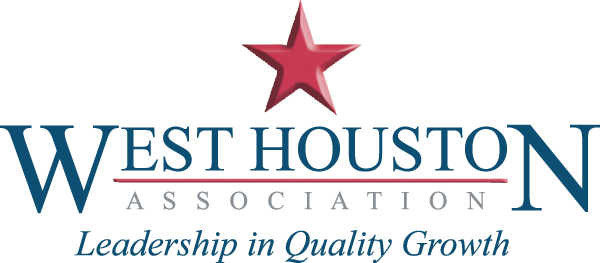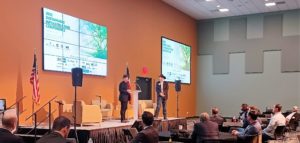 To highlight the importance of sustainable infrastructure in our community, the West Houston Association partnered with Houston Community College’s West Houston Institute and Texas A&M University’s College of Architecture and Division of Academic and Strategic Collaborations to host a free to the public, half-day sustainable infrastructure conference on Friday, February 11, 2022. The event brought together students, industry, and policy makers to engage and learn from one another, in what we hope will be the first in a series of conferences on sustainable infrastructure over the years to come.
To highlight the importance of sustainable infrastructure in our community, the West Houston Association partnered with Houston Community College’s West Houston Institute and Texas A&M University’s College of Architecture and Division of Academic and Strategic Collaborations to host a free to the public, half-day sustainable infrastructure conference on Friday, February 11, 2022. The event brought together students, industry, and policy makers to engage and learn from one another, in what we hope will be the first in a series of conferences on sustainable infrastructure over the years to come.
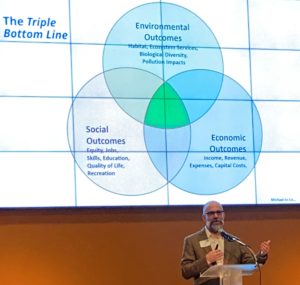 The mission of WHA’s Sustainable Infrastructure Committee guided the development of the conference: “to advocate for the use of sustainable infrastructure concepts through the education of members and stakeholders and recognition of projects and practices.” The conference started off with a presentation by Michael Bloom (R.G. Miller Engineers) and Liz Parent (5engineering), introducing the concept of sustainable infrastructure and defining sustainable development as “development that meets the needs of the present without compromising the ability of future generations to meet their own needs.” They also described the Envision framework and provided a quick walkthrough of the types of infrastructure, the system ratings and the categories that are scored. When asked about the future of Envision in the Houston area, both speakers expect more projects in the pipeline in the future.
The mission of WHA’s Sustainable Infrastructure Committee guided the development of the conference: “to advocate for the use of sustainable infrastructure concepts through the education of members and stakeholders and recognition of projects and practices.” The conference started off with a presentation by Michael Bloom (R.G. Miller Engineers) and Liz Parent (5engineering), introducing the concept of sustainable infrastructure and defining sustainable development as “development that meets the needs of the present without compromising the ability of future generations to meet their own needs.” They also described the Envision framework and provided a quick walkthrough of the types of infrastructure, the system ratings and the categories that are scored. When asked about the future of Envision in the Houston area, both speakers expect more projects in the pipeline in the future.
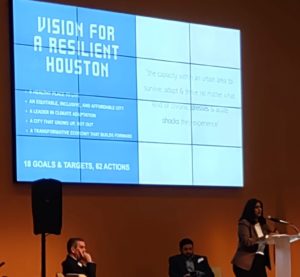 The audience then heard from policymakers, Priya Zachariah (City of Houston Chief Resilience and Sustainability Officer) and Nick Russo (Director – Environmental & Sustainability Services · Harris County Engineering Department) who spoke about sustainability efforts within the City of Houston and Harris County. Priya Zachariah focused on the “Resilient Houston” and “Houston Climate Action Plan,” including providing an update on where the city stands on progress towards the goals of the plans. Nick Russo started with sustainability efforts within the county-wide Transportation Plan and moved into a discussion of “Imagination Zones,” new communities using alternative land planning and platting guidelines that encourage a mix of housing types, multimodal transportation access, and will incorporate green building standards.
The audience then heard from policymakers, Priya Zachariah (City of Houston Chief Resilience and Sustainability Officer) and Nick Russo (Director – Environmental & Sustainability Services · Harris County Engineering Department) who spoke about sustainability efforts within the City of Houston and Harris County. Priya Zachariah focused on the “Resilient Houston” and “Houston Climate Action Plan,” including providing an update on where the city stands on progress towards the goals of the plans. Nick Russo started with sustainability efforts within the county-wide Transportation Plan and moved into a discussion of “Imagination Zones,” new communities using alternative land planning and platting guidelines that encourage a mix of housing types, multimodal transportation access, and will incorporate green building standards.
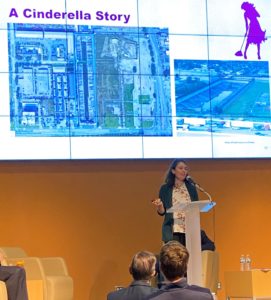 The second half of the conference included a panel of industry representatives, Mark Gehringer (Howard Hughes Corporation), Natalie Chaney (RPS Group), and Daniel Kornberg (HarrisonKornberg) discussing current applications of sustainable infrastructure in land development, engineering, and architecture. Mark Gehringer spoke about the Prairieland Village development in Bridgeland, and its guiding principles: engage people with nature, invest in contiguous ecological systems, and commitment to better stormwater management. Natalie Chaney told the story of Conrad Sauer which transformed the city owned, concrete, pumped detention basin into a beautiful community amenity providing bike and pedestrian connectivity. Daniel Kornberg talked about LEED Certification process and scoring, and then provided an in-depth case study of the new Harris County Precinct One Office Building seeking LEED Platinum status.
The second half of the conference included a panel of industry representatives, Mark Gehringer (Howard Hughes Corporation), Natalie Chaney (RPS Group), and Daniel Kornberg (HarrisonKornberg) discussing current applications of sustainable infrastructure in land development, engineering, and architecture. Mark Gehringer spoke about the Prairieland Village development in Bridgeland, and its guiding principles: engage people with nature, invest in contiguous ecological systems, and commitment to better stormwater management. Natalie Chaney told the story of Conrad Sauer which transformed the city owned, concrete, pumped detention basin into a beautiful community amenity providing bike and pedestrian connectivity. Daniel Kornberg talked about LEED Certification process and scoring, and then provided an in-depth case study of the new Harris County Precinct One Office Building seeking LEED Platinum status.
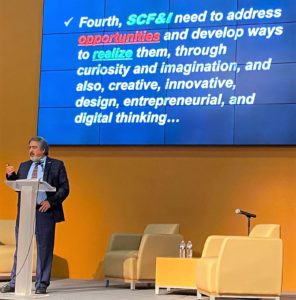 The event wrapped up with Dr. Jorge Vanegas (Texas A&M University’s Associate Vice President for Academic & Strategic Partnerships and Director of the Institute for Sustainable Communities) discussing how Sustainable Communities, Facilities, and Infrastructure (SCF&I) play a critical role in providing for quality of life. He stressed the imperatives to learn from the past to solve today’s problems with a vision of the future in mind, and to address our uncertain future by striving to stabilize and reverse the current unsustainable direction of our world with a vision of sustainability. The presentation highlighted the challenges towards a more sustainable future but also provided solutions, highlighting the need to build connections within and between silos and be willing to fight for the future we want.
The event wrapped up with Dr. Jorge Vanegas (Texas A&M University’s Associate Vice President for Academic & Strategic Partnerships and Director of the Institute for Sustainable Communities) discussing how Sustainable Communities, Facilities, and Infrastructure (SCF&I) play a critical role in providing for quality of life. He stressed the imperatives to learn from the past to solve today’s problems with a vision of the future in mind, and to address our uncertain future by striving to stabilize and reverse the current unsustainable direction of our world with a vision of sustainability. The presentation highlighted the challenges towards a more sustainable future but also provided solutions, highlighting the need to build connections within and between silos and be willing to fight for the future we want.
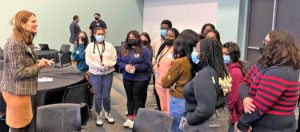
CM Sallie Alcorn speaking with AISD students
In considering the vision for West Houston, concepts of sustainability and resilience are critical as we look at the future of growth for our region. The West Houston Association has been committed to quality growth for over forty years. Working with a broad range of stakeholders, we strive to improve quality of life for the people who live, work, and play across the region through quality development, sustainable infrastructure, long term planning, and sound public policy.
